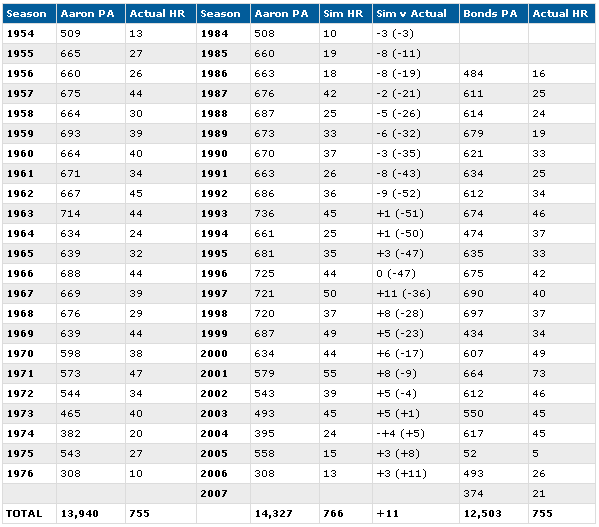Who’s Greatest Home Run Hitter of All Time?
Barry Bonds sits atop the record books, tied with Hank Aaron, and will pass him any day now. He might hit 800 before all’s said and done. Is he therefore the best of all time? ESPN’s Jim Caple, Rob Neyer, and Jayson Stark debate that point extensively.
Here’s an extensive excerpt:
Rob Neyer: Anyway, the question of course isn’t who’s got the record, or even what it “means” (because the first of those is self-evident, and I’m not smart enough to answer the second). I think a question we might be able to answer is not, “Who’s got the most home runs?” but rather, “Who’s the greatest home-run hitter?”
And in my mind, the answer obviously is Babe Ruth, because his home runs not only dominated the game, but changed the game. In 1919, Ruth hit 29 homers. People wondered if that record might stand forever. In 1920, he hit 54 homers, which was more than any other team in the American League. In fact, the Red Sox and Tigers that season didn’t combine to hit 54 home runs. I won’t try to argue that nobody else would have figured out that you could swing from your heels and hit the ball out of the park. But the Babe did figure it out. And considering that his numbers were overwhelming, I think he’s No. 1 with just a bit of extra credit for something nobody else had come close to doing before.
Jim Caple: My personal favorite Ruth note is that when he was a pitcher he several times hit more home runs than he allowed — and one of those seasons he threw more than 300 innings. His combination of pitching and hitting, I think it’s safe to say, will never be surpassed and is reason enough to consider him the best player of all time.
But he is not the ultimate home-run hitter …
The level of competition just wasn’t that good back then. Minorities were banned. Players were smaller. Simply put, Ruth was feasting off some mediocre talent. Sure, all-time greats such as Walter Johnson would have excelled in any era, but the average player of Ruth’s era simply couldn’t hold a torch to the modern player.
That’s why my pick for greatest home-run hitter is Hank. He did it even though much of his era was dominated by pitchers. He did it while teams were moving toward larger ballparks. And he did it without the aid of any performance enhancer.
Here’s my point. You take the three of these guys in their prime, allow each to prepare for an offseason with the same training facilities/supplements, and then send them off against the same pitchers for a season … and Hank will come out on top. He out-hit Ruth under tougher conditions, and he almost out-hit Bonds without Barry’s advantages. He is the home-run king.
Jayson Stark: While I’d side with Rob and argue that Ruth ought to be No. 1 on this list, I think you’re not giving Barry his due.
He played the first seven years of his career (1986-92) before The Home Run Era erupted — and the only two National Leaguers who hit more home runs than he did in that time period were Darryl Strawberry and Andre Dawson.
Then let’s accept the “Game of Shadows” timeline and look at his career from the beginning of the Home Run Era (1993) through 1998 — which, according to “Game of Shadows,” was before he met his friends from BALCO. The only National Leaguer with more homers than him in those years was Sammy Sosa — by one homer (236-235)! And the only players in the whole sport with a better home-run ratio than Barry were Mark McGwire and Junior Griffey. And that, remember, was in a period before Barry even got all that interested in hitting home runs.
So that’s not that different than Aaron during his own peak power years (1957-73), is it? Harmon Killebrew, Willie McCovey and Mickey Mantle all topped Hank in home-run ratio in that era, even though Hank out-totaled them.
So Jim, I’d like to hear your explanation for how Aaron was a more dominant slugger than Barry was. I think I’ve established that, measured against their peers, he and Barry held very similar places in their eras even if we don’t even count the years from 1999 on when we look at Barry. Your witness …
Jim Caple: It’s simple, Jayson. Bonds is a great, great player, probably in the top five of all time. But given that he is gasping to reach Hank’s total even after he probably took something stronger than Wheaties after 1998, I’d say Hank is the greater home-run hitter. I mean, you’re bringing up a couple guys (Dawson, Straw) in your argument who didn’t come within 400 home runs of Hank.
Again, give Hank the same advantages Barry has had, he might have had 800 home runs.
Of course, Alex Rodriguez hit his 500th homer last night at the age of 32, far younger than anyone else (the next youngest, Jimmie Foxx, was 330 days — nearly a full year — older). If he stays healthy, he could shatter the record. And there’s no hint of scandal in how he’s done it.
At this point, though, I’d say Ruth was the most dominant player, ever, but against mediocre talent. Aaron was the first great slugger of the modern era to stay healthy and motivated for twenty years. Bonds, asterisk or no, is probably a better athlete than either. And let’s not forget, he lost the equivalent of two seasons in his prime to labor disputes; he may well be at 800 already had that not happened. As it is, he’s reached Aaron’s milestone in 1500 fewer at-bats.
Charles Wolfson and Luke Kraemer of Imagine Sports take an interesting approach to this question:
Whether it was primarily steroid use, or some combination of factors, that noticeably boosted home run output throughout baseball since 1993, the end result can be “injected” (so to speak) into Aaron’s career (1954-76), by replaying it contemporaneously with the “Bonds era” (1986-2007) using the rates of offense for those years. Aaron played one more season than Bonds has played to this point (Aaron spent 23 years in the bigs), so we simulated Aaron’s career as if the overall rates of offense prevailing from 1954-76 were those of 1984-2006.
We replayed each season of Aaron’s career 20 times, as if it had taken place in the hitting environment of the corresponding season 30 years later, and averaged the results. Aaron finished his simulated career total of 766 home runs, 11 more than his actual total of 755, and just enough to leave in doubt whether Bonds would be able to catch and pass him — at least before the end of the 2007 season.
Here are the results of our simulations, compared to the actual career records for Aaron and Bonds:
Perhaps the most significant feature of these results is that, halfway into his “sim” career, Aaron was 50 home runs behind his actual career pace. The reason is that the 1950s, when Aaron began his career, actually were more offensively-oriented than the 1980s, when Bonds began playing. Aaron begins making up the home run difference when his seasons from the 1960s, at which time pitching was more dominant, are shifted to the homer-happy 1990s. He finally passes his actual career total when his twilight 1970s seasons are shifted to the new millennium.
More offense also means more at-bats, and Aaron, who achieved his actual HR total over nearly 1,500 plate appearances more than Bonds has had in his career, racked up an additional 387 plate appearances in his sim career. Other factors that may have favored Aaron (or Bonds) from season to season include the parks they played in and the protection they received in their teams’ lineups (Bonds has received a career record 676 intentional walks compared to 293 for Aaron).
There’s no way to settle any of this, of course, which is part of what makes it so fun.
- Mocking Barry Bonds
- 22 Reasons Bonds Won’t Pass Aaron
- Barry Bonds Hits 714th Homer, Ties Ruth
- Barry Bonds Hits No. 715, Passing Babe Ruth
- Bonds Resumes Aaron Chase But Eyes Future
- Aaron Would Rather Golf Than Watch Bonds
- Russ Springer Suspended for throwing at Barry Bonds
- Barry Bonds, Giants agree to $16M, 1-year deal
- Al Downing Has No Regrets Over 715
- Columnist: Bonds is Finished
- Eight is Enough- Edmonton beats Chicago 8-4
- Lydia Ko wins New South Wales Open
- The Comeback I- Pittsburgh Penguins beat NY Islanders 5-0
- Seattle Mariners Outfielder Greg Halman stabbed to death at age 24
- Hee Young Park wins CME Titleholders Championship
- Oklahoma State Women’s Basketball Coach Kurt Budke dead at 50
- Costly mistake- Blackhawks waive Rostislav Olesz
- Manager Tony La Russa announces retirement
- Puck Drop- Florida Panthers start the 2011-12 NHL season
- 13-time PGA Tour winner Dave Hill dead at 74
Comments are Closed










